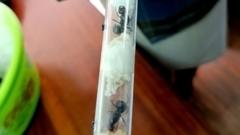In a startling development in wildlife trafficking, four men have been apprehended in Kenya for their attempt to illegally export hundreds of prized insects, specifically giant African harvester ants. This case, described as a "landmark" incident by the Kenya Wildlife Service (KWS), has raised alarms about shifting trends in the illegal wildlife trade, moving away from larger mammals and towards lesser-known species crucial for ecological health.
The suspects, comprising two Belgians, a Vietnamese, and a Kenyan, were caught with the ants concealed in modified test tubes lined with cotton wool—ingeniously designed to keep the insects alive for up to two months during transport. The KWS observed that these modifications were part of a "calculated attempt to evade security checks" by disguising the true contents within the tubes. They reported that the illicit shipment was headed for markets in Europe and Asia, where collectors maintain these insects as exotic pets.
Each giant African harvester ant (Messor cephalotes), valued up to £170 (about $220) in the UK, is sought after for its impressive size, with queens reaching up to 25mm. The growing interest in rare insect species has led to a significant rise in their illegal trade, raising concerns among wildlife authorities. KWS spokesperson Paul Udoto remarked that this operation represents Kenya's most extensive instance of "bio-piracy" thus far.
The enforcement operation leading to these arrests was characterized by its intelligence and coordination, revealing a careful strategy to combat this unconventional form of wildlife crime. The KWS emphasized that these ants are protected under international biodiversity laws, and the prosecution of the four suspects signifies Kenya's commitment to combat wildlife trafficking. Sentencing for the accused is scheduled for Tuesday, marking a pivotal moment in the global fight against wildlife crime.



















